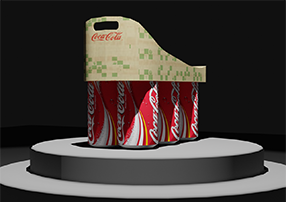Friends of Fauna
Friends of Fauna
| School: | SCAD |
| Team: | Anvith Vonna, Zeal Patel, Urja Dwivedi |

To understand the problem and to talk about how it affects the world, we took a deep dive into
understanding plastic. Plastic rings have been used for can packaging for four decades. While
the use of photodegradable plastic has been a better replacement, It hasn’t addressed the
impact these have on the environment. Fauna is affected, not just from the entanglement risk
before the rings degrade, but from ingesting micro-sized plastic particles. While a well-thought
plan for recycling has been in an effort, it hasn’t solved the issue completely. Recycling too
leaves smaller byproducts and is as harmful to the environment.
Some Facts we found to support this include:
1. Producing plastic rings also requires using petroleum—around eight percent of global oil
production is to make plastic.
2. EPA regulations say the resulting plastic fragments can range from particles too small to
see with the naked eye to pieces several centimeters across.
3. Recycling leaves smaller byproducts as the plastic breaks down. Scientists have
described these microplastics as a kind of “plastic soup,” and studies say that oceans
have anywhere from 15 to 50 trillion pieces of microplastic.
To further humanize the problem for context we understood that with an increase in the
production of plastic, we are inviting imbalance in the natural cycle. The lands will be filled with
plastic and vegetation will be affected. With the increase in the number of animals being killed,
we will drive more animal species towards extinction. Taking into consideration the amount of
plastic pollution that already exists, in our lands and oceans, it is high time to make better
lifestyle choices and move towards a healthier, more eco-friendly way of living.
To address this issue, We considered cutting down on microplastics and carbon emissions and
turning away from plastic rings entirely and replacing plastic with bamboo.
Bamboo fibers with their high mechanical properties make a sustainable alternative to synthetic
fibers. By using them to make the can carrier, we make our packaging is 100% biodegradable.
They grow fast, making them ideal for mass production. They are lightweight yet durable and
can easily carry the weight of the cans. The ergonomic design makes it easy to carry the bottles
and graphics start a conversation about being more considerate about the environment.
Friends of Fauna is a minimal packaging solution with a can carrier design that is 100%
biodegradable. It is designed such that the cans have a platform to stand on. This helps with a
better brand display. As one picks up the packaging, the cans slide down and make it easy to
handle. To make sure that we don’t move our main focus from the cans it is holding, Friends of
Fauna uses a simple design that only talks about the impact it has on the environment. Using
footprints of various animals and putting them with blocks to talk about how we together build
the environment creates an emotional impact reminding us of others we must consider while
indulging in our everyday activities.
